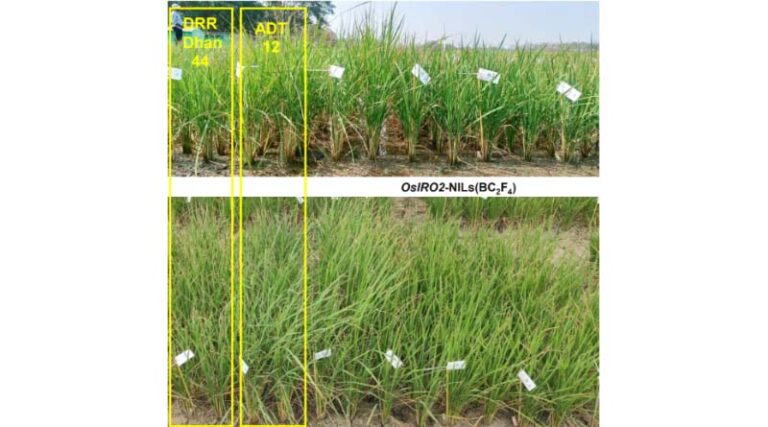
New Rice Gene Variant Boosts Yield Under Drought – IRRI
12 August 2025, Philippines: Scientists at the International Rice Research Institute (IRRI) and their partners in India have discovered gene variants that can boost rice yields under drought conditions through enhanced tolerance during the reproductive stage, a critical period when water stress can lead to major yield losses.
The study, published in the Journal of Experimental Botany, highlights a promising discovery of a variant of the gene OsIRO2 that showed strong potential when introduced into the widely grown variety DRR Dhan 44.
“Through this finding, researchers can now develop better rice varieties more precisely that withstand water scarcity while maintaining high yields,” said Dr. Pallavi Sinha, scientist at IRRI. “For farmers, this means better harvests and improved resilience, especially as climate change intensifies.”
To validate the results, the team developed rice lines carrying unique gene variants, known as superior haplotypes. These were tested against both the original parent (DRR Dhan 44) and the donor parent (ADT 12) in multiple field trials. In total, 450 rice lines were evaluated across various locations and growing seasons. Researchers found 67 genetic links to traits important for drought tolerance and identified ten key genes to prioritize in breeding programs.
The OsIRO2 gene variant was particularly notable. Rice lines carrying this variant produced up to 27 percent more grain under drought compared to the original variety, without compromising yield stability, which is an important trait for farmers facing unpredictable weather patterns.
While earlier research mainly focused on mapping broad genomic regions related to drought response, this study pinpoints a specific, high-performing gene variant. Field results confirm its value in developing rice varieties that are both resilient and productive.
“By using advanced genetic tools and working closely with our partners in India, we’ve been able to identify the exact parts of the genome that help rice survive drought,” said Dr. Vikas Singh, IRRI Regional Breeding Lead for South Asia. “This gives breeders a clear and practical target to develop improved varieties that protect farmers’ harvests.”
IRRI’s next steps will focus on integrating these drought-tolerant gene variants into breeding pipelines across Asia and Africa, aiming to deliver high-yielding, climate-resilient rice varieties for drought-prone regions.
The research was supported by the Department of Biotechnology (DBT) and the Indian Council of Agricultural Research (ICAR). The findings open new opportunities for next-generation rice breeding, particularly through marker-assisted and haplotype-based selection.
Also Read: UPL launches New Herbicide ‘Brucia’ for Maize Crop in India
📢 If You’re in Agriculture, Make Sure the Right People Hear Your Story.
From product launches to strategic announcements, Global Agriculture offers unmatched visibility across international agri-business markets. Connect with us at pr@global-agriculture.com to explore editorial and advertising opportunities that reach the right audience, worldwide.






